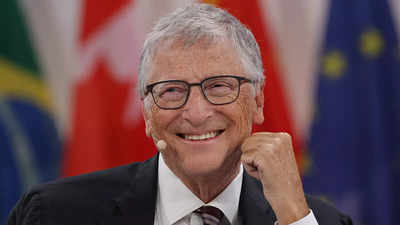- News
- Education News
- News
- Bill Gates doubted his math skills: His Harvard days, pancake puzzle and the billion dollar dropout decision
Trending
Bill Gates doubted his math skills: His Harvard days, pancake puzzle and the billion dollar dropout decision
Bill Gates' time at Harvard University was marked by self-doubt, especially about his math skills, but this fueled his determination to succeed. Surrounded by brilliant peers, Gates worked tirelessly in the computer lab, eventually dropping out to pursue his passion for software development. His collaboration on the "pancake sorting problem" showcased his problem-solving abilities. Despite initial insecurities, Gates' curiosity and intellectual drive led him to revolutionize the tech world by founding Microsoft.
Before he became the tech titan we all know, Bill Gates was just another Harvard student battling self-doubt, tough math problems, and an obsession with coding. His Ivy League stint was short—three semesters, to be exact—but it left a lasting impact on the way he approached learning, problem-solving, and, ultimately, changing the world.
The ‘Oh S---’ Moment
Imagine walking into Harvard, thinking you're a math whiz, only to realize your classmates might be even sharper.
Budget 2025 Updates
When Class Took a Backseat to Code
The Pancake Problem That Made History
Most students struggle with math assignments. Gates, however, solved a decades-old mathematical conundrum in record time. Enter the ‘pancake problem’, a quirky little puzzle about sorting stacks of pancakes in the fewest flips. Introduced to it one day, Gates returned just two days later with an optimized solution, which ended up in a 1979 academic paper. For nearly 30 years—until 2008—no one could improve on his method, when more powerful computers finally cracked a better solution.
The Professor Who Saw It Coming
Harvard professor Harry Lewis spotted Gates' genius early on. “He always wanted a challenge,” Lewis recalled in an interaction with a media house. So, when Gates left to start Microsoft, Lewis wasn’t surprised. His only regret? “I just wish I’d invested in him.” That might be the most relatable professor comment ever.
Dropping Out to Change the World
Gates didn’t leave Harvard because he couldn’t cut it—he left because he saw something bigger. In 1975, after reading about the Altair 8800 (an early personal computer), he and his childhood friend Paul Allen saw their golden opportunity. They built software for it, and before long, Microsoft was born. Gates reassured his parents that he’d return to Harvard if it didn’t work out, but let’s be real—there was no turning back.
Moral of the story? Sometimes, skipping class really pays off.
Stay updated with the latest education news on Times of India. Explore the CBSE date sheet for Class 10 and 12 across Arts, Science, and Commerce streams.
End of Article
FOLLOW US ON SOCIAL MEDIA





















